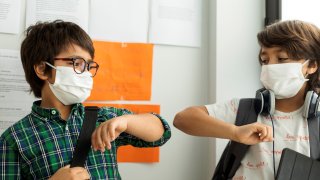
Is the delta variant of the coronavirus worse for kids?
No, experts say there's no strong evidence yet that it makes children and teens sicker than earlier versions of the virus, although delta has led to a surge in infections among kids because it's more contagious.
Delta's ability to spread more easily makes it more of a risk to children and underscores the need for masks in schools and vaccinations for those who are old enough, said Dr. Juan Dumois, a pediatric infectious disease physician at Johns Hopkins All Children’s Hospital in St. Petersburg, Florida.
Weekly infection rates among U.S. children earlier this month topped 250,000, surpassing the wintertime peak, according to data from the American Academy of Pediatrics and Children’s Hospital Association. Since the pandemic began, more than 5 million children in the U.S. have tested positive for COVID-19.
Get top local stories in Southern California delivered to you every morning. >Sign up for NBC LA's News Headlines newsletter.
The delta variant has been identified in at least 180 countries, according to the World Health Organization. In many of them, the spike in infections has also meant an increase in hospitalizations in young children and teens.
In the U.S., the hospitalization rate for COVID-19 was less than 2 per 100,000 children in late August and early September — similar to the peak last winter, according to the Centers for Disease Control and Prevention. But the portion of kids hospitalized with severe disease hasn’t changed significantly.
The sheer numbers can make it seem like children are getting sicker with the delta variant, but experts say that does not appear to be the case. Most infected kids have mild infections or no symptoms and do not need to be hospitalized.
COVID-19 vaccines continue to provide protection against delta. Among children 12 and older — who are eligible for COVID-19 vaccinations — the weekly hospitalization rate in July was 10 times higher for the unvaccinated than those who have had the shots, CDC data show.

